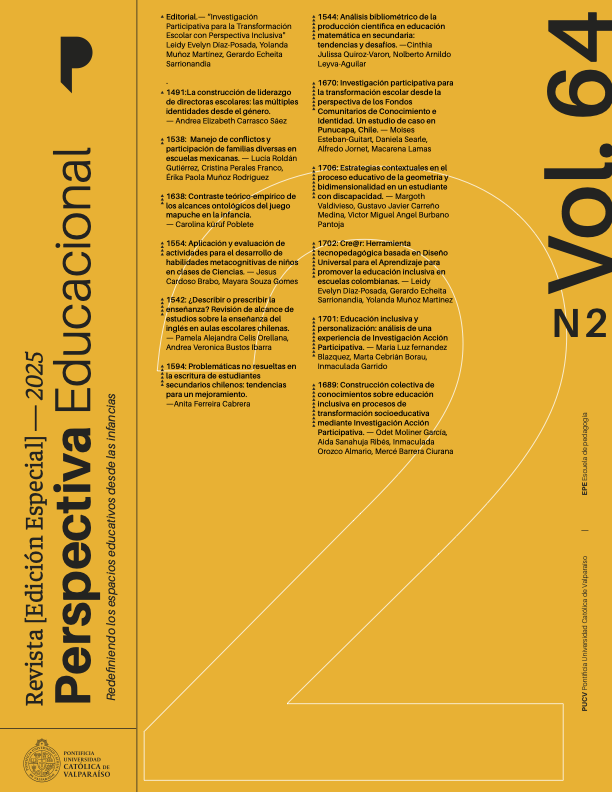Collective construction of knowledge on inclusive education in processes of socio-educational transformation through Participatory Action Research
DOI:
https://doi.org/10.4151/07189729-Vol.64-Iss.2-Art.1689Keywords:
Participatory action-research inclusive education co-construction of knowledge socio-educational transformation inclusive schoolAbstract
Despite advances in inclusive education, there remains a gap in understanding how knowledge is collectively constructed through collaborative processes involving teachers, researchers, and school communities. This study aims to explore the key factors involved in the development of more inclusive schools that have undergone change and transformation through Participatory Action Research (PAR) methodologies with an inclusive approach. To this end, six research projects conducted by the MEICRI group (Educational Improvement and Critical Citizenship) at Universitat Jaume I (Spain) were analysed. These projects shared a common inclusive perspective, followed the phases of PAR, and were grounded in the analysis of inclusive practices aimed at transforming schools from a socio-community and territorial perspective. The objective of the study is to critically examine the elements involved in the collective construction of knowledge, emphasizing interaction and dialogue among educational community stakeholders and university research teams. Specifically, it addresses three research questions: (1) What participation conditions influence the co-construction of knowledge? (2) What strategies facilitate the co-construction of knowledge? and (3) What communication or dissemination outputs support the co-construction of knowledge? A qualitative methodology was employed, based on documentary analysis of six research projects selected using four inclusion criteria: (a) completed projects, (b) competitively funded, (c) conducted within the last ten years, and (d) involving socio-educational transformation through PAR. Data were analysed through a deductive manual coding process and group discussions, structured around three analytical categories aligned with the research questions: conditions, strategies, and outputs. Findings highlight the relevance of incorporating less traditional, non-academic formats that value and collect narratives from all stakeholders, underscoring the principle that no one should be excluded from the knowledge production and communication processes at any stage of the research. The study underscores the importance of collective knowledge co-construction in PAR as a pathway toward socio-educational transformation and inclusion. Equitable collaboration and distributed leadership emerge as key conditions, though ongoing reflection is needed to balance roles and power among educational actors. The study concludes that the construction of inclusive, plural, and accessible pedagogical narratives remains a critical challenge, requiring the dismantling of professionalizing biases and the promotion of authentic community participation. PAR is reaffirmed as a fundamental approach for rethinking teacher education and professional practice, enabling the development of more democratic, critical, and transformative education. Furthermore, this article invites deeper reflection on how to conduct inclusive and emancipatory research that fosters more horizontal relationships with community actors and supports the creation and co-creation of knowledge through co-research strategies.
References
Aguirre A., Traver, J.A., & Moliner, L. (2012). La escuela incluida: Dinamizando la participación escolar en la comunidad mediante diagnóstico social participativo. Edetania: Estudios y propuestas socio-educativas, 41, 57-69. https://revistas.ucv.es/edetania/index.php/Edetania/article/view/248
Ainscow, M. (2020). Promoting equity in schools: Collaboration, inclusion and ethics. Routledge.
Ainscow, M., Booth, T., & Dyson, A. (2006). Improving schools, developing inclusion. Routledge. https://doi.org/10.4324/9780203967157
Arnaiz, P., Alcaraz, S., & Caballero García, C.M. (2024). Significados atribuidos a la educación inclusiva por la comunidad educativa. Revista Electrónica Interuniversitaria de Formación del Profesorado, 27(3), 135-152. https://doi.org/10.6018/reifop.617101
Bonilla, O. P., Buriticá, J.J., & Escárraga, S. L. (2015). Narrativas pedagógicas inclusivas en contextos educativos vulnerables: la voz del estudiante. Textos y Sentidos, (12), 25-40. https://revistas.ucp.edu.co/index.php/textosysentidos/article/view/272/262
Bowen, G. A. (2009). Document analysis as a qualitative research method. Qualitative Research Journal, 9(2), 27-40. https://doi.org/10.3316/QRJ0902027
Calderón, I., & Ainscow, M. (2025). Educación inclusiva: mapas, fronteras y caminos hacia el éxito. Teoría de la Educación. Revista Interuniversitaria, 37(2), 57-76. https://doi.org/10.14201/teri.32438
Calderón, I., & Rascón, M.T. (2022). Hilando luchas por el derecho a la educación: narrativas colectivas y personales para la inclusión desde el modelo social de la discapacidad. Pedagogía Social. Revista Interuniversitaria, 41, 43-54. https://doi.org/10.7179/PSRI_2022.41.03
Caspe, M., & Hernandez, R. (2024). From Classroom to Community: A Commentary on Preparing Educators for Family and Community Engagement. Journal of Teacher Education, 75(4), 369-381. https://doi.org/10.1177/00224871241259782
Catalano, T., & Morales, A.R. (2022). Dancing across difference: arts and community-based interventions as intercultural education. Intercultural Education, 33(1), 48-66. https://doi.org/10.1080/14675986.2021.2016214
Díez-Gutiérrez, E. J. (2020). Otra investigación educativa posible: Investigación-acción participativa dialógica e inclusiva. Márgenes Revista de Educación delLa Universidad de Málaga, 1(1), 115-128. https://doi.org/10.24310/mgnmar.v1i1.7154
Echeita, G. (2017). Educación inclusiva. Sonrisas y lágrimas. Aula Abierta, 46(2), 17-24. https://doi.org/10.17811/rifie.46.2.2017.17-24
Gimeno, C., & Escobedo, P. (2021). Movilización del conocimiento en educación inclusiva: Conceptualización, roles y estrategias. Márgenes Revista de Educación de la Universidad de Málaga, 2(2), 25-41. https://doi.org/10.24310/mgnmar.v2i2.10892
Gjermestad, A., Skarsaune, S. N., & Bartlett, R.L. (2023). Advancing inclusive research with people with profound and multiple learning disabilities through a sensory-dialogical approach. Journal of Intellectual Disabilities, 27(1), 40-53. https://doi.org/10.1177/17446295211062390
González-Gil, F., Martín-Pastor, E., & Poy, R. (2019). Educación inclusiva: Barreras y facilitadores para su desarrollo. Un estudio desde la percepción del profesorado. Profesorado, Revista de Currículum y Formación del Profesorado, 23(1), 243-263. https://doi.org/10.30827/profesorado.v23i1.9153
Guba, E.G., & Lincoln, Y.S. (1994). Competing paradigms in qualitative research. En N. K. Denzin, & Y. S. Lincoln (Eds.), Handbook of qualitative research (pp. 105-117). Sage.
Jové, G., Gutiérrez‐Ujaque, D., Bonastra, Q., & Simón‐Martín, M. (2022). From Hybrid Spaces to In‐between Spaces: A Journey with Contemporary Art and Situated Knowledge. International Journal of Art & Design Education, 41(2), 242-256. https://doi.org/10.1111/jade.12411
Kawai, T., Fahlbusch, J., Dienel, H., Renn, O., & Renn, R. (2022). Narratives for personal and collective transformations. Innovation: The European Journal of Social Science Research, 36, 1-10. https://doi.org/10.1080/13511610.2022.2137108
Kincheloe, J.L., & Steinberg, S.R. (1999). Unauthorized methods: Strategies for critical teaching. Routledge.
López-Ganet, T., & Mesías Lema, J.M. (2021). La autobiografía como metodología visual introspectiva en la investigación en educación artística. Revista de estudios e investigación en psicología y educación, 8(1), 139-158. https://doi.org/10.17979/reipe.2021.8.1.8553
Messiou, K. (2017). Research in the field of inclusive education: time for a rethink? International journal of inclusive education, 21(2), 146-159. https://doi.org/10.1080/13603116.2016.1223184
Miles, M. B., Huberman, A. M., & Saldaña, J. (2014). Qualitative Data Analysis: A Methods Sourcebook (3rd ed.). SAGE Publications.
Moliner, O., Arnaiz, P., & Sanahuja, A. (2020). Rompiendo la brecha entre la teoría y la práctica: ¿Qué estrategias utiliza el profesorado universitario para movilizar el conocimiento sobre educación inclusiva? Educación XX1, 23(1), 173-195. https://doi.org/10.5944/educxx1.23753
Moliner, O., Lozano, M., & Sanahuja, A. (2022). Construction of a participatory model of school accompaniment to improve school inclusion. Education Sciences, 12(10), 708. https://doi.org/10.3390/educsci12100708
Moliner, O., & Sales, A. (2019). ¡Con Mucho Arte! Intervención Psicopedagógica para la Justicia Social desde la Transformación Socioeducativa. Revista Internacional de Educación para la Justicia Social, 8(2), 33-47. https://doi.org/10.15366/riejs2019.8.2.002
Moliner, O., Sales, A., & Traver, J. A. (2011). Trazando procesos de desde un modelo educativo intercultural inclusivo. En O. Moliner (Ed.), Prácticas inclusivas: experiencias, proyectos y redes (pp. 29-40). Publicaciones de la Universitat Jaume I.
Moliner, O., Traver, J.A., Ruiz, M.P., & Segarra, T. (2016). Estrategias que inciden en los procesos de democratización de la escuela. Una aproximación teórica. Revista Electrónica De Investigación Educativa, 18(2), 116-129. http://redie.uabc.mx/redie/article/view/1110
Murillo, F.J., & Krichesky, G.J. (2015). Mejora de la Escuela: Medios de lecciones aprendidas. REICE. Revista Iberoamericana sobre Calidad, Eficacia y Cambio en Educación, 13(1), 69-102. https://doi.org/10.15366/reice2015.13.1.005
Naidorf, J. (2014). Knowledge utility: From social relevance to knowledge mobilization. Education Policy Analysis Archives, 22(89), 1-37. https://doi.org/10.14507/epaa.v22n89.2014
O’Neill, M. (2018). Walking, well-being and community: Racialized mothers building cultural citizenship using participatory arts and participatory action research. Ethnic and Racial Studies, 41(1), 73-97. https://doi.org/10.1080/01419870.2017.1313439
Parrilla, Á., Raposo, M., & Martínez, M.E. (2016). Procesos de movilización y comunicación del conocimiento en la investigación participativa. Revista de Ciencias Humanas y Sociales, 12, 2066-2087. https://goo.gl/P9xaX6
Sales, A., Moliner, O., & Traver, J.A. (2019). Estrategias de investigación-acción participativa para la transformación. En B. Ballesteros (Ed.), Investigación social desde la práctica educativa (pp. 225-266). UNED.
Sales, A., Traver, J.A., & García, R. (2011). Action research as a school based-strategy in intercultural professional development for teachers. Teaching and Teacher Education, 27(5), 911-919. https://doi.org/10.1016/j.tate.2011.03.002
Sandoval, M., & Waitoller, F. (2022). Ampliando el concepto de participación en la educación inclusiva: un enfoque de justicia social. Revista Española de Discapacidad, 10(2), 7-20. https://doi.org/10.5569/2340-5104.10.02.01
Sepúlveda-Ruiz, M. del P., Calderón-Almendros, I., & Torres-Moya, F.J. (2012). De lo individual a lo estructural. La investigación-acción participativa como estrategia educativa para la transformación personal y social en un centro de intervención con menores infractores. Revista de Educación, 359, 456-480. https://doi.org/10.4438/1988-592X-RE-2011-359-102
Slee, R. (2018). Inclusive Education isn't Dead, it Just Smells Funny. Routledge. https://doi.org/10.4324/9780429486869
Susinos, T., Saiz-Linares, A., & Ruiz-López, J. (2022). “Queremos que esto llegue a mucha gente” o cómo la movilización del conocimiento sostiene la investigación social participativa. Archivos Analíticos de Políticas Educativas, 30(154). https://doi.org/10.14507/epaa.30.6794
Terrón, T., Cárdenas, R., & Rodríguez, R. (2017). Educación intercultural inclusiva. Funciones de los/as educadores/as sociales en instituciones educativas. Pedagogía Social. Revista Interuniversitaria, 29, 25-40. https://doi.org/10.7179/PSRI_2017.29.02
Traver, J.A., Sales, M.A., Moliner, O., Sanahuja, A., & Gil, A.B. (2018). Hacia una escuela incluida en su territorio: análisis de una práctica comunitaria. Edetania. Estudios y Propuestas Socioeducativos, (53), 99-116. https://revistas.ucv.es/edetania/index.php/Edetania/article/view/339
Wenger, E. (1999). Communities of practice: Learning, meaning, and identity. Cambridge University Press. https://doi.org/10.1017/CBO9780511803932
Zamiri, M., & Esmaeili, A. (2024). Strategies, Methods, and Supports for Developing Skills within Learning Communities: A Systematic Review of Literature. Administrative Sciences, 14(9), 231. https://doi.org/10.3390/admsci14090231
Downloads
Published
How to Cite
Issue
Section
Categories
License
Copyright (c) 2025 Odet Moliner García, Aida Sanahuja Ribés, Inmaculada Orozco Almario, Mercé Barrera Ciurana

This work is licensed under a Creative Commons Attribution-ShareAlike 4.0 International License.
The authors grant an exclusive licence, without time limit, for the manuscript to be published in the Perspectiva Educacional journal, published by the Pontificia Universidad Católica of Valparaíso (Chile), through the School of Pedagogy.





